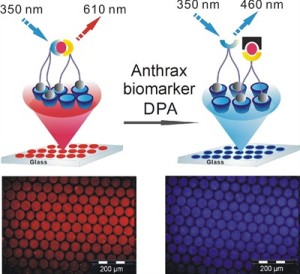Jul 23 2010
Nanotechnologists of MESA+ Research Institute belonging to the University of Twente have created a sensor to identify Anthrax caused by the bacterium, Bacillus anthracis.
 Nanotechnologists of MESA+ Research Institute belonging to the University of Twente have created a sensor to identify Anthrax caused by the bacterium, Bacillus anthracis.
Nanotechnologists of MESA+ Research Institute belonging to the University of Twente have created a sensor to identify Anthrax caused by the bacterium, Bacillus anthracis.
Anthrax, infamous for being a major element in letter bombs, is highly transmissible and also a deadly disease brought by the spores of the bacteria. These spores can thrive longer in the environment. The new sensor can identify a biomarker of the spores, and find out if they are present in an area one thousand times lower than the toxic level.
This sensor is much more potent and perceptive than the existing detection methods such as mass spectroscopy and fluorescence. Similar to the conventional techniques, the UT sensor quantifies the amount of DPA (dipicolinic acid) which forms 5 to 15% of the spores’ dry weight. The device consists of a DPA sensitive receiver fixed to a glass plate. When the anthrax spores get in touch with the receptor, the DPA gets linked to the spores. The spores’ concentration can be estimated using fluorescence spectroscopy by beaming UV light on the sensor.
The receptors which are DPA bonded immersed in the radiance gives out a blue beam, while the receptors that have not bonded with the spores will exude a red glow. By determining the red to blue light ratio in the sample, the intensity of anthrax spores can be estimated. The plus points for these sensors are that they do not necessitate calibration. The next stage would be recording the data on a high tech chip, thus making the process completely automatic.